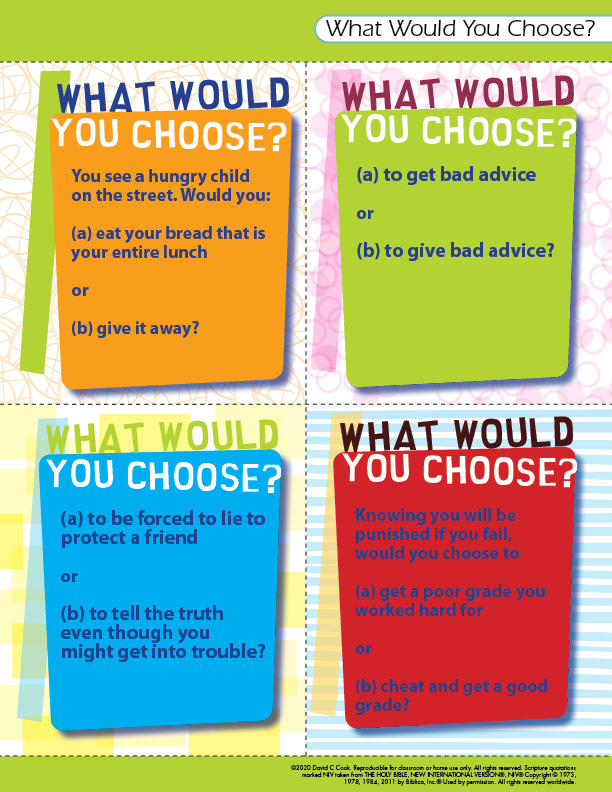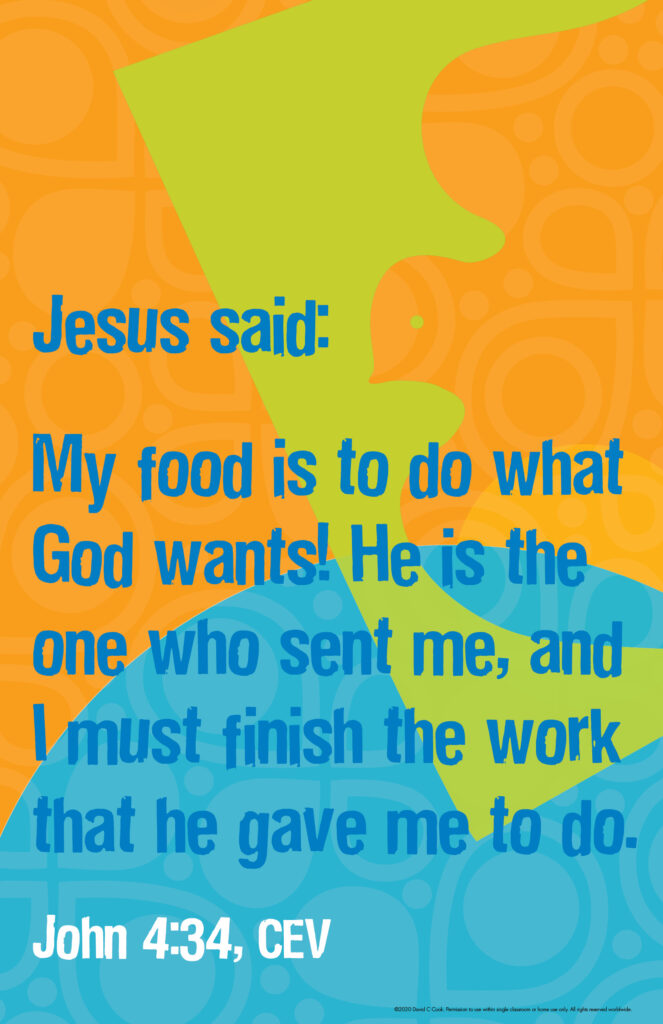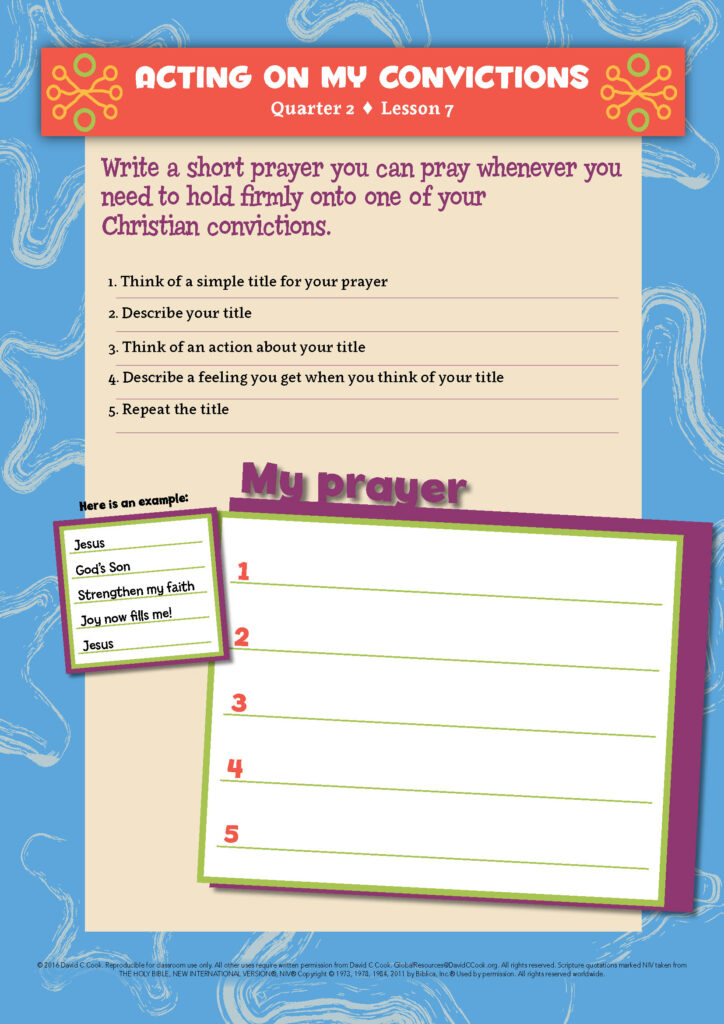During the lesson, the information for you to know is written in regular type, and what we suggest speaking or reading aloud to children is in bold. All resources for this lesson, including the Teacher Guide, Student Page, Family Connection Card, and other resources can be downloaded in a ZIP file by clicking on the following link:
In some lessons you will find "resource articles." These are articles written by experts from around the world to help equip you for your work with children and adolescents. Share them with parents or guardians if you consider it appropriate.
Jesus said: “My food is to do what God wants! He is the one who sent me, and I must finish the work that he gave me to do.”
John 4:34, CEV
When we read where Jesus used the phrase, “I must,” we begin to understand the conviction He held—that He must do His Father’s will. His purpose was defined by this conviction.
Think about the “I must” statements in your life. Maybe your list includes phrases such as “I must tell others about Jesus” or “I must make enough money to support my family.” Think about what these statements say about your purpose.
Now give your “I must” statements to God in prayer. Ask Him to show you what it would look like for your life and purpose to be defined simply by the words, “I must do God’s will.”
Encourage the children to share their “I must” statements with their families this week.
Teacher Tip: If possible, email or text the Family Connection Card to the families of your students.
As children gather, ask if anyone can share how their convictions affected others in a positive way last week.
Today we will continue to learn about convictions—strong beliefs that affect your thoughts, attitudes, and actions. Let’s start by playing a game about the convictions you hold. I will tell you a question with two options and point to two areas of the room. You will decide which statement is something you would choose and quickly move to that side of the room.
Read each statement and point to one of the two different areas of the room for (a) or (b) in each statement. If you are using the optional What Would You Choose cards, show those as you read each situation. Give the children a moment to quickly move to the side they would choose. Ask one child from each side why he or she chose that way. Then repeat with the other statements. The first question is a simplified example which is not on the cards.

Clap for the children’s choices about their convictions. Ask them to sit down.
Convictions are more powerful than simple beliefs. Convictions can cause you to make the right decision, even if it results in hardship. For example, if you have a conviction that stealing is wrong no matter what, you may go hungry instead of stealing fruit at the market.
All people have convictions that influence their decisions. Many people who are not Christians still hold strongly to convictions about what is right and what is wrong. As we learn more about God from the Bible and spend time talking with Him in prayer, our Christian convictions will grow stronger and stronger. This will help us become more and more like Jesus.
Over the past couple of weeks we have talked about conviction. If you believe strongly in something, your strong conviction will make a difference in how you think and act. You may stick to your conviction even if it means going hungry or not having a safe and warm place to sleep at night.
After I tell the story, we will talk about it. Remember, this is not a Bible story. In this pretend story, the animals have qualities like people do. For example, they can talk and make choices. Real animals cannot do these things. Real animals do not have convictions. This is a fable, a story written to teach children and adults an important lesson.
One day a fat dog met a skinny wolf in the woods and began to talk. The dog talked about the delicious food his owner gave him in the morning. He shared about the shed where he slept in comfort every night.
The dog asked if the wolf wanted to come live with him. The wolf began to think of how wonderful it would be, to not have to hunt for food every day. He thought about how cold he got sleeping outside in the winter. The wolf said that he would be very happy to have regular food and sleep in a warm place.
Then he asked, “What do I have to do in order to have these wonderful things?”
The dog replied, “You have to chase away thieves, bark at visitors, and be nice to the people.”
The wolf thought this was a wonderful opportunity. So they began to walk back to the house where the dog lived. Then the wolf noticed that there was a spot on the back of the dog’s neck that was raw and missing fur.
“What happened to your neck?” he asked the dog.
The dog replied, “Oh, that is nothing. It is only where the chain rubs me at night.”
“You wear a chain at night! If that is the price of food and shelter, then I would rather be hungry and free. Good-bye.” The skinny wolf left the fat dog and returned to the woods.
Both animals had strong convictions and acted on them. Neither conviction was totally right or totally wrong. But each conviction made a difference in how each animal acted. Each animal received different benefits and suffered different hardships because of its conviction. Like the dog and the wolf, your convictions affect your decisions.
A Christian teacher named Howard Hendricks wrote that “a belief is something you will argue about. A conviction is something you will die for!” Today we will learn about Someone who was willing to die because of His convictions: Jesus.
The Bible tells us that Jesus, God’s Son, came to earth as a baby and lived among people.
Jesus had a conviction while He lived on earth as a human that greatly influenced His actions and decisions.
We can often recognize people’s convictions when they use the phrase, “I must.” Let’s hear some “I must” statements that Jesus said.
The first time the Bible tells us that Jesus said “I must” was when He had stayed in the temple as a 12-year-old boy and his parents were looking for him.
Read the verses below directly from your Bible so the children understand this is God’s Word.
“But why did you need to search?” he asked. “Didn’t you know that I must be in my Father’s house?”
Luke 2:49, NLT
Another time Jesus said, “I must” was when people wanted Jesus to stay in their town and keep teaching and healing people there.
But he said, “I must preach the good news of the kingdom of God to the other towns also, because that is why I was sent.”
Luke 4:43
One time Jesus said, “I must” was to explain that He was like a shepherd and those who followed Him were like sheep. He said He would go look for all those who were His sheep to join Him.
I have other sheep that are not of this sheep pen. I must bring them also. They too will listen to my voice, and there shall be one flock and one shepherd.
John 10:16
We hear Jesus say, “I must” when His disciples urged Him to eat something.
Jesus said: “My food is to do what God wants! He is the one who sent me, and I must finish the work that he gave me to do.”
John 4:34, CEV

Whenever Jesus spoke about His Father, He was always referring to God, His heavenly Father. Jesus had a conviction to follow His Father’s will no matter what. Jesus cared more about doing what God had planned for Him and wanted Him to do than doing what was easiest or most comfortable. On the night before Jesus was put to death on the cross, He was very sad. He knew that He was about to suffer horrible pain. So Jesus prayed to His Father, God.
Again Jesus went to pray and said, “My Father, if there is no other way, and I must suffer, I will still do what you want.”
Matthew 26:42, CEV
Allow children to offer their thoughts.
Jesus could have decided not to allow Himself to be crucified. But Jesus knew God’s purpose for Him on earth was to suffer the penalty for our sin by dying on the cross.
We will each create our own “I must” statement about a conviction we have. Remember that a conviction is something that influences how we think, act, and decide. We will not change or give up on our convictions, even if it means that life will be difficult.
Listen as I tell you one of my convictions. I believe with all my heart that Jesus loves me, and I can love Him my whole life. He makes my life worth living. Because of this conviction, I must share my faith with other people.
Share how you came to accept Jesus as Lord and Saviour. Children will love the story, and it is helpful for them to know a little about your life. It makes you more real to them.
In our activity at the beginning of class, you might have been left standing alone or with just a few others depending on your choice. Sometimes having a conviction means you may stand alone. But if you believe in that conviction strongly enough, you are willing to do that.
Now each of you will take a couple of minutes to think of a conviction you have and create an “I must” statement for it. For example, you might say, “I have a conviction that stealing is wrong. So I must not steal food even if I am hungry.”
Here are a few questions that will help you decide if a belief you have qualifies as a conviction. Answer these questions quietly to yourself.
Give the children a couple of minutes to identify a conviction and create an “I must” statement. When they have a statement, they should stand up. As each child stands, ask him to share his conviction and “I must” statement. Continue until every child is standing. If a child cannot think of something, help her come up with an idea.
If you are a Christian, you can ask the Holy Spirit to help you live by your conviction. He is always there to help you live in ways that honor God.
Optional: If you are using the Student Pages, the children can write prayers asking for help to act in ways that agree with their convictions.

End the lesson by praying a blessing over the children.
Blessing: May you hold your convictions so strongly that you do not have any doubts about them. May you live your whole life with the strong conviction that you are loved by God and that nothing in the world—absolutely nothing—can separate you from God’s love.
Lead the children in singing “Blessed Be Your Name” again. Remind them that they can thank God even when they have doubts or things are difficult.
Life on Life ©2020 David C Cook. Reproducible for home or classroom use only. All other uses require written permission from David C Cook [email protected]. All rights reserved.